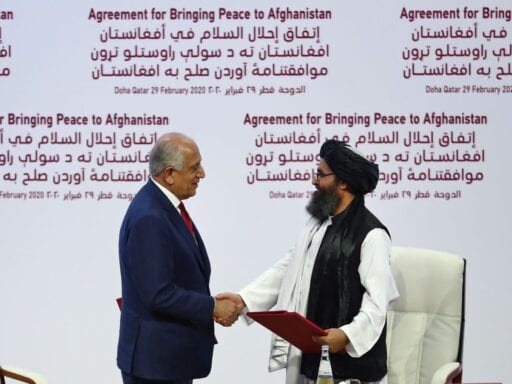The US has agreed to pull all of its troops from Afghanistan within 14 months.
The United States and its NATO allies will withdraw all troops from Afghanistan by late April 2021 under a peace deal between the US and the Taliban signed Saturday in Qatar. The agreement marks a major step towards ending the war in Afghanistan, America’s longest conflict, which stretches nearly two decades.
Under the agreement, the US will gradually withdraw its 12,000 service members in exchange for a Taliban commitment to neither aid nor harbor terrorists, as well as to exchange prisoners, and to enter into talks with the US-backed Afghan government. Taliban members will also receive sanctions relief as part of the deal.
A media copy of the deal signed today pic.twitter.com/hmEjV09ijV
— J.p. Lawrence (@JpLawrence3) February 29, 2020
“These commitments represent an important step to a lasting peace in a new Afghanistan, free from Al Qaeda, ISIS, and any other terrorist group that would seek to bring us harm,” President Donald Trump said in a statement Friday, ahead of the signing ceremony. “Ultimately it will be up to the people of Afghanistan to work out their future.”
Since the war in Afghanistan began in 2001, the US government has spent $2 trillion on the conflict, in which 3,500 American and NATO coalition troops have been killed and tens of thousands of Afghans have died.
The new agreement would put an end to that conflict, and includes a requirement that the Taliban find lasting peace with the Afghan government in exchange for the full withdrawal of troops — a requirement not present in all past versions of the deal.
The deal is an important first step, but concerns remain
Afghan officials are skeptical of the agreement for a number of reasons. For one, the deal doesn’t require an immediate ceasefire; the US settled instead for a partial ceasefire tested in the week ahead of the signing. Also, the Taliban do not recognize the US-backed government as legitimate; this has been a stumbling block in past peace efforts, and may be difficult to overcome.
“We are giving it a sincere chance,” a senior Afghan official, speaking on the condition of anonymity, told Vox’s Alex Ward last week. “It’s hard to trust the Taliban.”
There is also concern over what will happen to the women and other groups that were repressed under Taliban leadership in the 1990s, but who have — with the advent of the US-backed government — begun to enjoy increased freedoms and rights, particularly because the group was not required to make a commitment to protect civil rights under the agreement.
In an effort to allay some of these concerns, US officials have said it will reduce troop levels gradually.
“Fully reducing our presence in Afghanistan down to zero — our ultimate goal — will take many months,” US Secretary of Defense Mark Esper said Saturday.
The first step of this process will be reducing the number of American troops in the country to 8,600 within the next 135 days; the agreement states the full withdrawal must happen in the next 14 months.
The Afghan government will also agree to work with the UN Security Council to remove the Taliban from the list of sanctioned groups by May 29, where they’re subject to an assets freeze, travel ban, and arms embargo.
The peace negotiations began in earnest in 2018 as Trump attempted to fulfill a promise of his 2016 campaign, but were met with a number of setbacks, including a Taliban attack that killed a US soldier and more than 10 others last September. Now, ahead of November’s election, the deal allows Trump to tout the completion of a major campaign pledge.
And the Taliban are also viewing the deal as a clear victory — and one for which they had to make few compromises. “From here, the defeat of the arrogance of the White House in the face of the white turban will be announced,” wrote the Taliban’s multimedia chief on Twitter Friday, according to the New York Times.
Author: Riley Beggin
Read More



